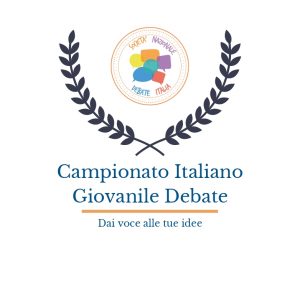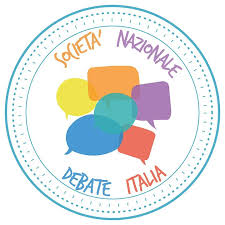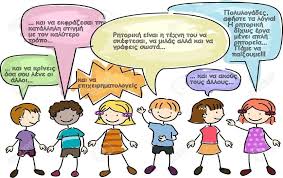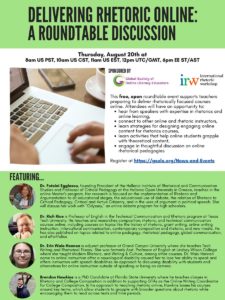
13.10.2020. Εκπροσώπηση του Ι.Ρ.Ε.Σ.Ε. στην Κριτική Επιτροπή του 1ου Πανιταλικού Πρωταθλήματος Αγώνων Αντιλογίας Νέων (Campionato Italiano Giovanile di Debate)

Συνεργασία του Ι.Ρ.Ε.Σ.Ε. με τη Società Nazionale Debate Italia / Eθνική ΄Ενωση Αγώνων Αντιλογίας της Ιταλίας
Ο φορέας Εθνική Ένωση Αγώνων Αντιλογίας Ιταλίας/ Società Nazionale Debate Italia δημιουργήθηκε στις 28 Mαρτίου 2019 στο πλαίσιο της της διοργάνωσης των Εθνικών Ολυμπιακών Αγώνων Αντιλογίας στην πόλη Bagni του Τίβολι της Ιταλίας (26-29 Μαρτίου 2019). Στόχος της είναι η ανάπτυξη και η διάχυση των αγώνων αντιλογίας ως μέσο καλλιέργειας της πολιτειότητας των νέων. Διασυνδέεται με το Δίκτυο «We Debate» και το υπουργικό πρόγραμμα της Ιταλίας «Αγώνες Αντιλογίας Ιταλίας» / Debate Italia.

19.10.2020. «Αγώνες αντιλογίας Οdyssey στην εκπαίδευση STEM: “Eνεργειακό Ζήτημα: Πυρηνική ενέργεια και ανανεώσιμες μορφές ενέργειας”»
6.10.2020. Έγκριση προγράμματος ρητορικής για μαθητές Π.Ε. και διοργάνωση Φεστιβάλ Ρητορικής «Παιχνίδια Ρητορικής Τέχνης στο Σχολείο: Σκέφτομαι… Εκφράζομαι… Επικοινωνώ…»

Eγγλέζου, Φ. 2013β. Αγώνες αντιλογίας (debate) και επιχειρηματολογία στη διδακτική προσέγγιση του γνωστικού αντικειμένου της γλώσσας (2013), στα πρακτικά του 1ου Πανελληνίου Συνεδρίου της ΠΕΣΣ (Κόρινθος, 23-4 Νοεμβρίου 2013) με τίτλο «Σύγχρονες Διδακτικές Προσεγγίσεις». Τόμος 1, σσ. 114-124.
Περίληψη
H παρούσα εισήγηση στοχεύει στην ανάδειξη των αγώνων αντιλογίας στο πλαίσιο
αναζήτησης αποτελεσματικών μέσων διδασκαλίας του γνωστικού αντικειμένου της
γλώσσας. Γίνεται λόγος για βελτίωση των προφορικών και γραπτών ικανοτήτων
οργάνωσης και χρήσης της γλώσσας. Χάρη στην αντιλογία οι μαθητές ασκούνται
στην ενεργητική ακρόαση και κατανόηση της αντίθετης άποψης, καλλιεργούν τον
ορθολογισμό, την κριτική σκέψη και την ενσυναίσθηση. Ως ‘προθάλαμος’ κριτικού
προβληματισμού και νοηματοδότησης της πραγματικότητας, οι αγώνες αντιλογίας
συντελούν στη διαμόρφωση κοινωνικοπολιτιστικών στάσεων, ενώ σφυρηλατούν τη
διαμόρφωση κριτικά σκεπτόμενων, δημοκρατικών πολιτών. Η επίτευξη των
παραπάνω στόχων προϋποθέτει τη λειτουργική ενεργοποίηση των
γραμματικοσυντακτικών, σημασιολογικών και επικοινωνιακών δομών της γλώσσας
μέσα από διαλογικές διαδράσεις με κλιμακωτό βαθμό δυσκολίας ανάλογα με τις
αναπτυξιακές δυνατότητες των μαθητών.
Φωτεινή Εγγλέζου. Αντιλογία και επιχειρηματολογία final
20.8.2020. Παρουσίαση των on-line debates ‘Οdyssey’ σε διεθνές στρογγυλό τραπέζι ρητορικής
Στις 20.8.2020 στις 18.00 μ.μ. θα γίνει παρουσίαση της on-line διεξαγωγής των αγώνων αντιλογίας Odyssey, ως καλής πρακτικής γραμματισμού και προώθησης της ρητορικής παιδείας, σε διεθνές στρογγυλό τραπέζι. Η εκδήλωση με τίτλο «H έκφραση της ρητορικής on-line: Μια συζήτηση σε στρογγυλό τραπέζι/Delivering rhetoric on-line: A roundtable discussion» διοργανώνεται από τη Διεθνή Εταιρεία των οn-line Εκπαιδευτικών (Global Society of on-line Litearcy Educators) και το Διεθνές Εργαστήριο Ρητορικής (International Rhetoric Workshop).
To link της συνάντησης είναι https://us02web.zoom.us/j/85273706365?pwd=QWd2SXJ0amNsejRYYUtyYm9GbFZzZz09

Egglezou, F. (2014). Argumentative literacy and rhetorical citizenship. The case of Genetically Modified Food in the institutional setting of a Greek primary school. In Chr. Kock & L. Villadsen (eds.) Contemporary Rhetorical Citizenship (pp. 183-204). Amsterdam: Leiden University Press.
Introduction
Ever since antiquity, rhetoric, as bipolar thinking and arguing upon every issue, has been interwoven with the instillation of virtues such as reflection, reasoning, awareness of the civil identity and of the sense of common good. In our era, characterized by rapid social and economic changes at both the polis and the cosmopolis levels, such an effort becomes essential for the formation of a more reasonable and humanistic social reality. Therefore, teaching rhetorical argumentation, even in the earliest stages of education, becomes one of the most powerful tools for the attainment of such a goal through the development of multi-level literacies and the concomitant construction of individual and social identities.
Papadopoulou, Sm. & Egglezou, F. (2010). Meta-cognitive and meta-linguistic awareness of students’ knowledge on argumentation in defining the terms “argument” and “counterargument”, US-China Foreign Language, 8(7), pp. 1-12
Abstract: Definition of the words “argument” and “counterargument” in a case study research with 91 Greek students of 5th and 6th grade present children’s prior knowledge on argumentation and persuasive writing. This study is a part of broader research concerning teaching experimental strategies of an intervention program in Greek public schools with teaching and learning persuasive language, and meaning making in a writing class. The authors discuss the results of this study in evaluation of a questionnaire’s data. The data confirm the existence of cognitive, meta-cognitive and meta-linguistic limitations in their intervention: Children’s pre-existing understanding of concepts and terms, such as “argument”, “counterargument”, “fallacy”, etc., is limited, if not absent. Findings on students’ limited declarative knowledge in defining what an “argument” or a “counterargument” is, indicate the need of a systematic and effective integration of arguments and especially this of counterarguments, as procedural knowledge in teaching argumentative writing with children at the age of 10-12 years.
Key words: definition; argument; counterargument; teaching; writing
Papadopoulou, Sm. & Egglezou, F. (2013). Teaching for thinking and rhetoric: The contribution of rhetoric to the argumentative writinng of students in a Greek elementary school. In H. Van Belle, P. Gillaerts, B. Van Gorp, D. Van de Mieroop and K. Rutten Verbal and Visual Rhetoric in a Media World (pp. 176-183). Amsterdam: Leiden University Press
Introduction
An optimum medium for developing abilities such as critical thinking and analysis of an argumentative text down to its components, is the early and systematic training of students in argumentative writing within a school context. An effective way of reaching this goal could be to expose the students to interactive pactives conducive to writing as a social act- able to «address self in society and social relation to self» (Shor, 1987, p. 95). Rhetorical pedagogy is closely related to this effort (freeley and Steinberg, 2009, p.3; Johnson, 1996, p. 46; Strnberg & Spear-Swerling, 1996, pp. 66-8).
